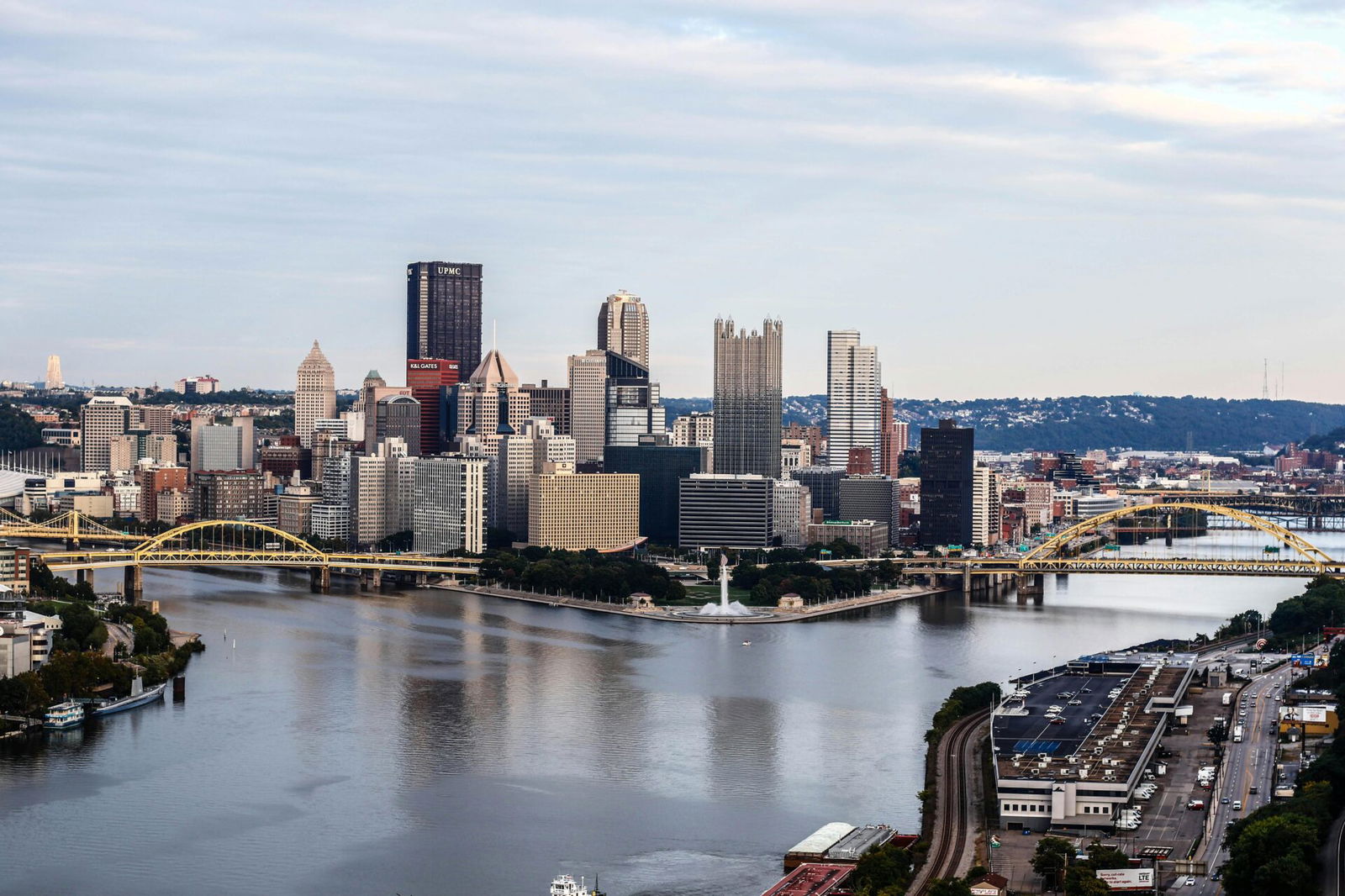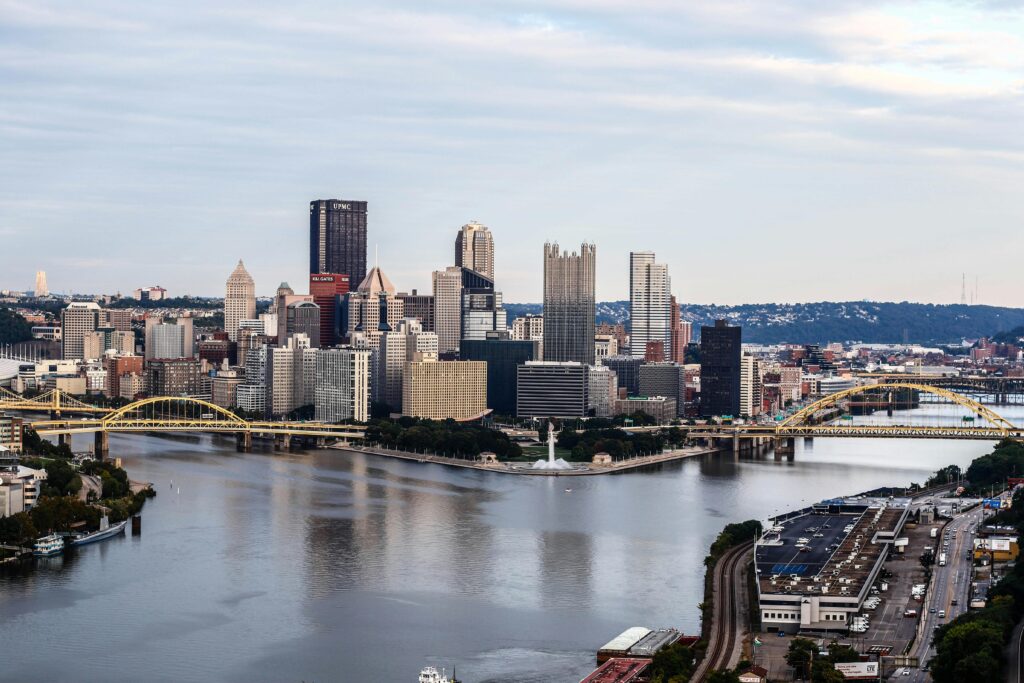
October 2, 2025
Pittsburgh’s vibrant Black history and culture continue to drive the city’s flourishing Black business community.
When people think of Pittsburgh, Pennsylvania, its steel legacy and passionate sports culture usually spring to mind first. But with over 440 bridges linking its many communities, the “Steel City” also carries a unique energy shaped by its rich Black history and thriving business scene.
The Pittsburgh International Jazz Festival, alongside the National Coalition of Black Meeting Professionals (NCBMP), offered the perfect opportunity to explore the city’s rich Black business and cultural scene. NCBMP’s visit was part of its mission to tour potential host cities with members, exploring destinations that can best amplify and celebrate the Black experience.
“NCBMP’s motto is simple: we do business with our friends,” NCBMP President Jason Dunn told BLACK ENTERPRISE. “Our members are committed to supporting destinations that mirror the core values of our organization. Places that are empowering, welcoming, and unapologetically dedicated to celebrating the richness of the Black experience, all while offering world-class accommodations.”
Dunn continued. “Visit Pittsburgh has exemplified this commitment, demonstrating a genuine interest in expanding its reach within our $145 billion economic impact, and aligning with our vision for a more inclusive and prosperous future.”
Pittsburgh’s Homewood neighborhood is home to Everyday Cafe, a “Café with a Cause” launched by the Bible Center Church to unite neighbors in a warm, welcoming space over fresh, handcrafted food and drinks. The walls are lined with black-and-white photos celebrating Black life and history, alongside reminders of the cafe’s deep roots in the Black church and community. From hosting a weekly farmers market to serving up lattes that encourage locals to vote, the cafe blends culture, community, and purpose into every detail.
“Our dream is to provide a beautiful and peaceful space in our community to celebrate art and culture, create jobs, and encourage the growth of the Homewood Avenue business district,” the company website states.
Everyday Cafe operates as a social enterprise of The Oasis Project, the community outreach and economic development arm of Bible Center Church. Its placement in Pittsburgh’s Homewood neighborhood is intentional, given the area’s long history of economic challenges. In 2015, child poverty in parts of Homewood exceeded 70%, more than twice the rate of children living in poverty across the city of Pittsburgh and Allegheny County. With its location, Everyday Cafe looks to mobilize locals and build a stronger, more connected community, one meal at a time.
Anyone visiting Pittsburgh won’t be disappointed when strolling along Butler Street in Pittsburgh’s trendy Lawrenceville neighborhood, where you can see why Walter’s Southern Kitchen has become a local favorite. Co-founded by friends Joel Bolden and Chris Morgan, who brought together 20 years of culinary expertise from New York and Texas, Walter’s has built a reputation for serving some of the city’s best BBQ and Southern comfort food. The menu speaks volumes: tender brisket, smoky chicken wings, pulled pork, and cornbread so soft it feels like slicing into cake, paired perfectly with whipped butter.
The vibe is just as inviting as the food. At the entrance, games welcome guests to grab and play at their tables, while picnic-style seating on the patio makes it easy for families and friends to gather. Inside, TVs line the bar, creating a lively sports-bar feel, while the space also nods to the owners’ roots in NYC and Texas. A longtime waitress shared how much she loves the movie nights and watch parties Walter’s hosts, creating a space where locals come together for food, fun, and community. One visit is all it takes to see why Pittsburgh has embraced Walter’s with so much love.
Health-conscious tourists looking for a boost of energy can stop by 1:11 Juice Bar for a refreshing, freshly squeezed juice. Founded by Bruce “Eric” Thornton and his wife Emily in April 2022, the juice bar has quickly become a neighborhood favorite. Bruce first got the idea after visiting a juice bar in Boston and was inspired to create a similar space in Pittsburgh that offered delicious smoothies, snacks, and cold-pressed juices crafted with mind, body, taste, and accessibility in mind.
Rooted in community, 1:11 Juice Bar goes beyond serving drinks. The business actively supports local youth programs like the Center of Life and the Spartan Community Center, giving young people access to fresh produce and a welcoming place to start their day. It’s more than just a juice stop; it’s a hub for nourishment and connection.
“I think what I’ve seen is that people really admire what we’re doing here in the sense of offering a healthy product in a neighborhood like Hazelwood, which is just building up, trying to rebuild the neighborhood,” Bruce told BLACK ENTERPRISE. So we’re a part of that. And it’s really an honor.”
“We’ve been embraced by the community. And the kids come up to get free fruit and juice and things like that before school starts,” he added. “So it’s been good for us. It’s been great just being in communion with them.”
Named after both the Genesis 1:11 scripture and the spiritual significance of the 1:11 angel number, Bruce infused his juice bar with a sense of mindfulness and purpose. Born in Texas but raised in Pittsburgh, he understands the city’s challenges and how often locals feel they must leave to find opportunity elsewhere. For Bruce, choosing to stay and build in Pittsburgh isn’t just a business decision—it’s an act of resilience and a commitment to creating change that uplifts his community.
“I think that the Black community itself in Pittsburgh, with the outcomes that we have here, is pretty resilient,” Bruce said. “A lot of people leave, but the ones that stay know that they’re staying and having a battle. If you stay here, you’re making a commitment to try to make it better. So I think that’s what I see about our community. I see a lot of people who may have opportunities in other places, but still stay because they want to see something change and grow here.”
Another standout Black-owned business in Lawrenceville is the holistic skincare shop, Plants for Skin, which handcrafts products designed to nurture every skin type. Those who enter the boutique shop are welcomed by the calming aroma of natural herbs and oils the team uses to craft their products right in the back. The shelves were lined with soaps, body oils, balms, and creams made for everyday use.
The brand was founded by Monae Findley, a Jamaican native who grew up watching her grandmother create holistic skincare remedies and noticed the lack of those offerings in the market. With just a $100 investment from her mother, Findley launched an online store in 2020, followed by the opening of her brick-and-mortar in 2023. Since then, Plants for Skin has grown into a global brand while staying rooted in community. Locally, it has collaborated with neighbors like 1:11 Juice Bar, which crafted a custom drink inspired by the brand’s golden face mask for their “drink your skincare” campaign, a beautiful example of two Black-owned, holistic businesses lifting each other up.
Explore Pittsburgh’s sports legacy at the Clemente Museum, a curated collection honoring the legendary Roberto Clemente—the Puerto Rican Hall of Famer and Pittsburgh Pirates right fielder who tragically died at 31 in a New Year’s Eve plane crash while delivering aid to earthquake victims in Nicaragua. Housed in the former Engine House No. 25 in Lawrenceville, the museum is home to the world’s largest collection of Clemente artifacts and memorabilia.
Inside, you’ll find everything from professional sports photography and family snapshots to uniforms, gloves, bats, balls, and even seats from Forbes Field. Founded in 2007 by photographer Duane Rieder, who first connected with the Clemente family in 1994, the museum not only preserves Clemente’s legacy but also carries it forward through charitable donations and initiatives that reflect his lifelong commitment to giving back, on and off the field.
The celebration of Pittsburgh’s Black history and excellence comes alive at the annual Pittsburgh International Jazz Festival, hosted at the August Wilson African American Cultural Center in Downtown Pittsburgh. This year’s festival kicked off inside the Cultural Center, buzzing with energy as live jazz filled the air, the aroma of local food vendors wafted through the crowd, and attendees laughed, danced, and soaked in the vibrant atmosphere. Surrounded by a striking collection of Black art, the setting provided the perfect backdrop for a weekend honoring music, culture, and soul.
The Center not only showcases contemporary and historic works of Black artistry but also honors August Wilson himself, Pittsburgh’s own literary giant. Visitors can walk through immersive exhibits of Wilson’s upbringing in the Hill District and explore his legacy as “theater’s poet of Black America.” His acclaimed 10-play series, The Pittsburgh Cycle, including Fences, Ma Rainey’s Black Bottom, and The Piano Lesson, captures the depth and beauty of African American life in the 20th century. Two decades after his passing, Wilson’s influence still looms large in his hometown, making the Center both a cultural hub and a living tribute to his storytelling genius.
Each year, the Pittsburgh International Jazz Festival unfolds just outside the Center, carrying forward the city’s creative spirit while honoring Wilson’s legacy of building spaces where Black culture thrives. A tour of the Historic Hill District brought us to Wilson’s childhood home, where engravings in the ground allow you to walk Wilson’s path to his old front door. A lush green space sits outside with seating space that lets anyone who passes know they are welcome.
A giant monument greets Hill District visitors upon entry. With a Martin Luther King Jr. quote and the names of local civil and human rights activists engraved into the ground, the monument serves as a nod to the Hill District’s roots as a hub for Pittsburgh’s liberation movement. Its location near Downtown made it a target for developers as the city grew. However, it was the heart of locals that ensured that the Hill District wasn’t gentrified and remained true to its foundation of serving the locals who have always called it home. The Hill District monument sits on Freedom Corner, where every civil rights march in Pittsburgh started.
During the tour, NCBMP further explored the organization’s legacy and its advocacy for Black professionals in the tourism industry and other sectors often affected by microaggressions, pay disparities, and bias; challenges that have grown amid recent pushback against diversity, equity, and inclusion in the workplace.
“The legacy of our foundation is rooted in holding the industry accountable,” Dunn said. “For decades, NCBMP has been a driving force speaking truth through data-driven dialogue and equipping our members with the tools to succeed.”
Dunn continued. “Now more than ever, our mission is critical: to empower our members with actionable insights that position them to compete at the highest levels, and to serve as the conscience of an industry that must reflect the diversity and excellence of the communities it serves.”
The weekend in Pittsburgh reached its peak at the Pittsburgh International Jazz Festival. Performances by Kandace Springs, Keith David, Jazzmeia Horn, Eric Benet, and Bilal outside the August Wilson African American Cultural Center on Liberty Ave had attendees dancing, singing, and connecting over live music that honored the diaspora. A few days in Pittsburgh made it clear that its Black culture and history run so deep, they can’t be ignored.
RELATED CONTENT: Pittsburgh Pirates Will Place Roberto Clemente No. 21 Logo Back On Right Field Wall





